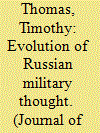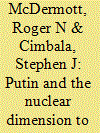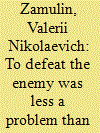|
|
|
Sort Order |
|
|
|
Items / Page
|
|
|
|
|
|
|
| Srl | Item |
| 1 |
ID:
148990


|
|
|
|
|
| Summary/Abstract |
This article highlights both the evolution of Russian thinking and Russian General Staff interest in a concept known as new-type warfare. In early 2015, General-Lieutenant A. V. Kartapolov, then director of the Russian General Staff’s Main Operation’s Directorate, both explained the concept in an article written for the Journal of the Academy of Military Science and provided a schematic visualization of the concept. Before this revelation, Western analysts had thought that the Russian military was using either hybrid warfare concepts or new-generation warfare (NGW) means. In response to these assertions from the West, Russian military officers stated that they do not conduct hybrid war, noting clearly that this is a Western method for waging modern war. However, two retired Russian officers did write extensively on NGW in 2012 and 2013, which prompted much discussion in the West. This concept was not directly refuted by Russian military officers, which may mean it is still a relevant way to consider warfare within the ranks of military professionals. At this moment, however, with General Staff backing, it appears that the new-type warfare concept has won out over NGW, although an evolution and integration of thinking is also apparent in the progression from hybrid, to NGW, to new-type warfare.
|
|
|
|
|
|
|
|
|
|
|
|
|
|
|
|
| 2 |
ID:
148993


|
|
|
|
|
| Summary/Abstract |
The KGB of the USSR Council of Ministers, whose interests in the entire Communist bloc were threatened by the reform process of the Prague Spring, had a major share in the preparation and course of the occupation of Czechoslovakia in August 1968. The espionage apparatus of the First KGB Main Directorate was considerably strengthened by the chairman of the KGB, Y. V. Andropov. pecial groups of members of Czechoslovak State Security (StB) were activated in the nights from 20 to 21 August 1968 and charged with taking control of the headquarters of the secret police and paralyzing selected party and state institutions, including communications, radio, and television.
|
|
|
|
|
|
|
|
|
|
|
|
|
|
|
|
| 3 |
ID:
148991


|
|
|
|
|
| Summary/Abstract |
The Russian Federation’s approach to the use of armed force abroad is a concern for other states. This case study of Russian armed force use against Ukraine in 2014 and 2015 employs an analytical framework based on Russian conceptualizations. Distinguishing between military and non-military means and measures, we analyze Russia’s deployment of armed forces to carry out measures in interstate conflict resolution, focusing on military forces deployed for non-military measures. We find that the use of armed forces in Ukraine largely conforms to Russian conceptualizations, allowing for extensive fighting without it amounting to a military conflict in the Russian view.
|
|
|
|
|
|
|
|
|
|
|
|
|
|
|
|
| 4 |
ID:
148994


|
|
|
|
|
| Summary/Abstract |
There is much confusion on the issue of when the Polish-Soviet war broke out. Various authors hold that the war started anywhere between late 1918 and early 1920. It is arguable, though, that from a Polish perspective the war began with the January 1919 Soviet attack on the city of Wilno (Vilnius), defended by its Polish inhabitants. Since Poles widely believed the Wilno region to be a part of Polish national territory, the government in Warsaw felt it had little choice but to treat the attack as a casus belli.
|
|
|
|
|
|
|
|
|
|
|
|
|
|
|
|
| 5 |
ID:
148992


|
|
|
|
|
| Summary/Abstract |
This article analyzes, as based on NATO enlargement strategy and its very nature underpinning democratization and social and political transformation, Montenegro’s bid for NATO membership from 2006 to 2015 by discussing two issues: on the one hand, democratic stabilization and civilian control of the armed forces, and on the other, military reform that has happened in this respect so far. The article confirms that NATO enlargement policy has profoundly impacted the process of democratic stabilization of Montenegro, which as a state has become more democratically mature and institutionally stable, in essence a consolidated democracy. The article also claims that Montenegro has demonstrated visible and significant progress in its military reform, not only by creating a good basis for improving the existing defense capabilities and capacities, but far more importantly by continuing its reform of the defense system, investing in military modernization, and achieving an appropriate level of interoperability in accordance with the NATO standards. As a result, the Montenegrin Army is readily deployable in NATO-led operations and missions.
|
|
|
|
|
|
|
|
|
|
|
|
|
|
|
|
| 6 |
ID:
148989


|
|
|
|
|
| Summary/Abstract |
Nuclear weapons and nuclear strategy have found themselves as parts of the discussions among expert and other commentators about the future of Russian President Vladimir Putin and about Russia’s military-strategic options in Europe following its annexation of Crimea and destabilization of Eastern Ukraine. This study considers some of the nuclear-related aspects of Putin’s and Russia’s survivability with respect to: (1) principal challenges for NATO in the face of improving Russian military capabilities and plausible strategies, (2) the future relationship between Russia’s conventional military and nuclear capabilities and military-strategic priorities, and (3) assessment of Russia’s threat perceptions in the context of its ‘strategic history’.
|
|
|
|
|
|
|
|
|
|
|
|
|
|
|
|
| 7 |
ID:
148996


|
|
|
|
|
| Summary/Abstract |
The most important component of any fighting army’s success is its established rear services. Unfortunately, as recently disclosed documents in the Russian Federation’s Central Archive of the Ministry of Defense [TsAMO RF] bear witness, in the spring of 1943 during the preparation for the battle of Kursk, which became a fundamental turning point in the Great Patriotic War, the supply services of the Voronezh Front that was holding the southern shoulder of the Kursk salient were working poorly and seriously affected both the level of combat readiness and the morale of its personnel.
|
|
|
|
|
|
|
|
|
|
|
|
|
|
|
|
| 8 |
ID:
148995


|
|
|
|
|
| Summary/Abstract |
Ukraine underwent a second democratic revolution in 2013–2014, which led to the overthrow of President Viktor Yanukovych. The article analyzes the sources of the failure since the Euromaidan Revolution of Dignity to reform the rule of law, reduce high-level corruption, and apply justice to Yanukovych and his entourage for massive corruption that bankrupted Ukraine, murder of protestors, and treason.
|
|
|
|
|
|
|
|
|
|
|
|
|
|
|
|
|
|
|
|
|